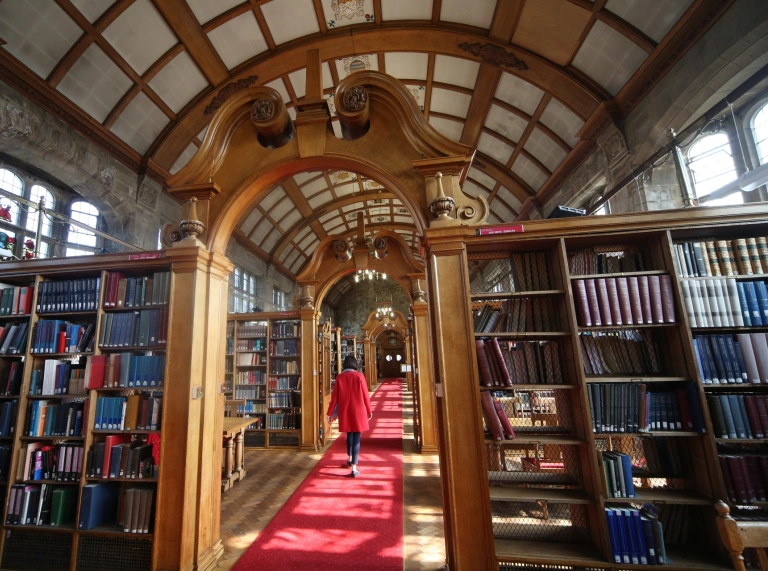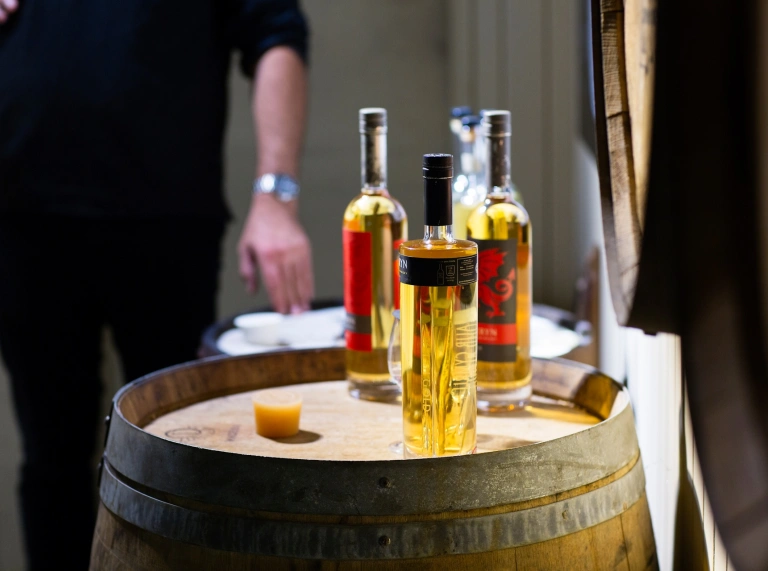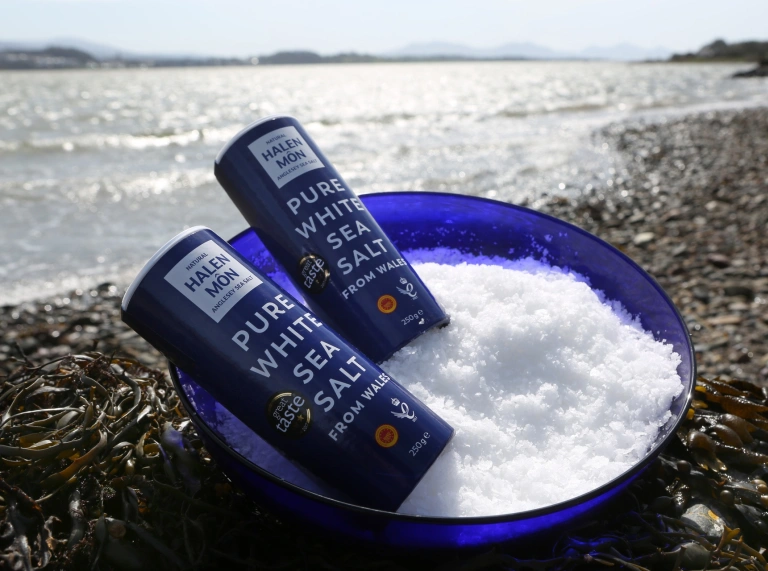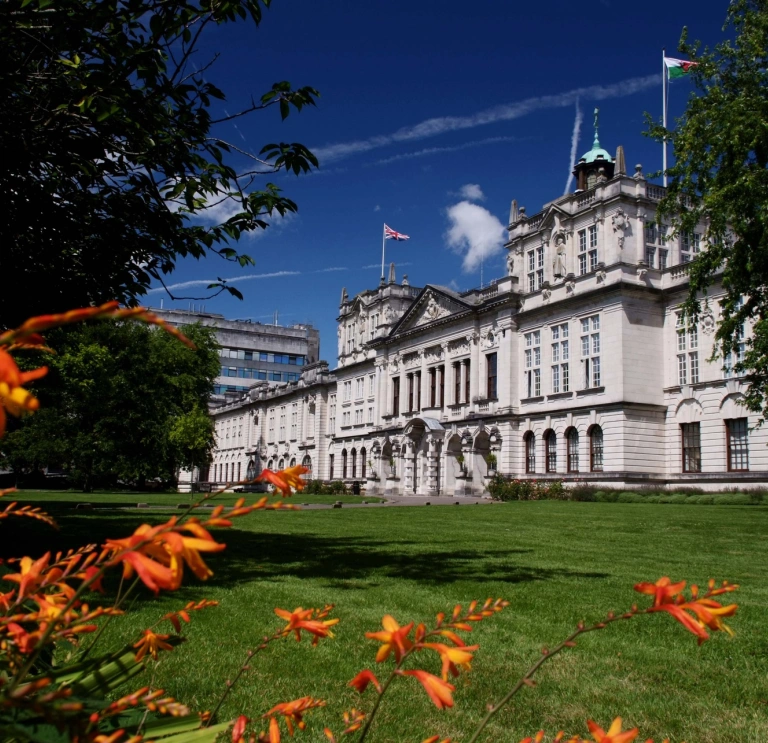Living and learning
Wales is a popular holiday destination for Germans: around 85,000 visitors make their way here each year. Some like Wales so much, they decide to stay. According to the latest census, our nation is home to about 11,000 people born in Germany.
Welsh universities are as much of a draw as the coast, castles, and countryside. In 2022, 505 students from Germany were enrolled at Wales’ eight universities, making up the second-biggest European Union contingent. Many academic exchange programmes are in place, including schemes linking Cardiff and Bremen universities, and Bangor’s law school with Johannes Gutenberg-Universität in Mainz. What’s more, Germany is the nation with the highest number of partnerships with Wales under the Horizon Europe research and innovation programme.


Business partners
Welsh trade links with Germany go back a long way. Slate from Porthmadog was used to rebuild Hamburg after its catastrophic fire of 1842, and became such an important import that Welsh sailing ships were named after German slate merchants’ wives. By the start of the 20th century, vast cargoes of Welsh steam coal were being sent to Germany from the ports of Cardiff and Barry.
Today, Germany is among Wales’ most important international trade partners. In recognition of this, the Welsh Government opened Berlin and Düsseldorf offices in 2018, with a mission to boost Wales’ profile and seek out new trade and investment opportunities.
Germany is Wales’ third-greatest export market, behind the United States and the Republic of Ireland. In 2022, it accounted for goods worth £2.4 billion. In imports, Germany sits in fourth place, having sent just over £1.3 billion worth of goods to Wales in the same year.
Around 75 German-owned companies have a presence in Wales, and are thought to employ more than 12,000 people. Some are familiar names on the high street, including giants of retail (Aldi and Lidl) and public transport (Arriva). German firms operate in a range of hi-tech sectors, from healthcare diagnostics and cyber security (Siemens) to renewable energy (RWE).
Civic siblings
Twenty-six Welsh towns and cities have twinning arrangements in Germany. Cardiff and Stuttgart became partners in 1955 – the first of many such relationships between Wales and the south-west German state of Baden-Württemberg. Others include Swansea and Mannheim, twinned in 1957, and Neath and Esslingen (1958), Bridgend and Langenau (1972) and Newport and Heidenheim (1980).
The special relationship between Wales and Baden-Württemberg led to the signing of a Memorandum of Understanding in 1990, and the agreement was re-affirmed in 2023. However, it’s not the only part of Germany with twinning connections to Wales. Pembroke has been linked since 1977 with Bergen, Lower Saxony. In 2017, Aberystwyth named a new skate park after Kronberg im Taunus, its twin town in the German state of Hesse.
Twinning isn’t just for towns. Since 2006, Ffestiniog and Welsh Highland Railways, one of our most scenic heritage lines, has been twinned with the narrow-gauge Harzer Schmalspurbahnen in north-east Germany. Staff and volunteers organise regular exchanges, sharing their enthusiasm for the age of steam.


Similar tastes
When it comes to food and drink, some Welsh exports have proved a hit in Germany. When the Bonn chocolatier Georgia Ramon started using Halen Môn sea salt from Anglesey as an ingredient in its confections, it drove a steady sprinkle of German visitors (and several film crews) to the company’s visitor centre on the Menai Strait. Penderyn whisky is another Welsh brand to find favour, with Germany established as one of its four big export markets alongside China, France and the USA.
It’s not all one-way traffic. In 1882, the UK’s first lager brewery was set up in Wrexham by German immigrants Ivan Levenstein and Otto Isler. Their attempt to recreate an authentic Bavarian brew succeeded, thanks to the quality of the local water, and Wrexham Lager was deemed good enough to be served on board the Titanic. The brand was revived in 2011, in a new facility built by German brewing engineers Kaspar Schulz.
Stars of stage and field
Throughout the years, cultural exchanges between Wales and Germany have ensured a lively trade in ideas. Recent successes include the 2018 Szene:Wales theatre and arts festival in Dresden, which saw an eclectic bill of Welsh talent perform in the Saxon capital, and ‘We are Wales: Disparate Voices, Landscapes and Stories’ at the 2021 Literaturhaus Stuttgart festival. Established and up-and-coming Welsh writers travelled to the city for readings, workshops and presentations.
Sporting links deserve a mention, too. Several Welsh footballers have played in the two divisions of the elite German Bundesliga – among them Ethan Ampadu and Rabbi Matondo in recent years, and Mark Hughes (a future manager of the Wales team) in the 1980s. In rugby, our other national game, there are fewer connections to report. Jamie Murphy of Bridgend represents a rare exception: in 2017, he made his debut for the German national rugby team, having qualified through his grandmother’s nationality.





